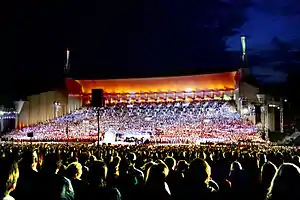Latvian Song and Dance Festival
The Latvian Song and Dance Festival (Latvian: Vispārējie latviešu Dziesmu un Deju svētki) is one of the largest amateur choral and dancing events in the world and an important event in Latvian culture and social life.
| Latvian Song and Dance Festival | |
|---|---|
 2008 Latvian Song and Dance Festival | |
| Genre | choral music, folk music |
| Years active | 1873–present |
| Attendance | approx. 500,000 (2018)[1] |
As one of the Baltic song festivals, it is also a part of the UNESCO Masterpieces of the Oral and Intangible Heritage of Humanity list since 2008.[2]
The All-Latvian Song Festival has been held since 1873, normally every five years, with the Latvian Dance Festival component added in 1948.[3] During the festivals exhibitions of photography, art and folk craft, orchestra concerts, and a festive parade also take place.
Events and competitions leading up to the event occur throughout the period between festivals. Additional festivals were held in 2001 and 2011, both on major anniversaries of the founding of Riga.
Approximately 40,000 performers altogether participate in the event.[4] Folk songs and classical choir songs are sung, with emphasis on a cappella singing, though modern popular songs have recently been incorporated into the repertoire as well.
Since 1960, a distinct Latvian School Youth Song and Dance Festival (Latvian: Latvijas Skolu jaunatnes dziesmu un deju svētki) is held in an alternate five-year cycle, on a matching scale.[5]
History
The tradition of song festivals originated in the first half of the 19th century in many European countries and later was also organized by the Baltic Germans. The first steps taken in Latvian environment was during the song days in Dikļi in 1864, which led to the resounding of a full-scale song festival in Riga during the summer of 1873. 1,003 singers and 30 orchestra players participated in the first festival. Only once has the festival been held outside Riga, in Jelgava in 1895.

.jpg.webp)
After the Soviet occupation of Latvia in 1940 and World War II, festivals were continued in the Latvian SSR, heavily influenced by Soviet ideology and used to praise the occupation regime, with the festival being held every 5 years on important anniversaries of the nation's forced accession as a Union Republic, while the festival was held in 1973 to mark its centennial anniversary and in 1977 to mark the diamond jubilee of the October Revolution, both events connected to the centennial commemorations of The First Latvian National Awakening.
During the occupation the festival tradition was continued in exile, first in displaced persons camps after World War II, primarily in the western zones in Germany, then in the United States, Canada, and Australia, with many of the legendary conductors of the past taking part during those years alongside the later generations of conductors they trained. The Overseas Song and Dance Festival is currently held every four years, alternating between the United States and Canada.[6]
The 1985 edition would be notable for the grand finale concert in which the legendary hymn The Castle of Light (Gaismas pils) conducted by Haralds Mednis, who was hated by the pro-Soviet government and was not listed as one of the performing conductors in that concert, was sung at the behest of the participating choristers.
The song, which speaks about the rebirth of a free Latvian nation, was and is usually a staple of the festival's song list and was not performed thrice in its history (1960, 1965 and 1977), and had been performed in the 1980 edition in the presence of Annija Vītola, widow of the song's composer Jāzeps Vītols, marking 80 years since it was first performed.[7]
The 24th Festival was held in July 2008. The main events were held at the Mežaparks Great Bandstand and the Daugava Stadium in Riga. The 25th Festival took place in July 2013.[8]
81,309 of the 95,250 available tickets for 26th Festival's various events were sold on the first day.[9] The festival took place from 1–8 July 2018, marking the 100th anniversary of Latvian independence, encompassing 65 events with a total of 500,000 expected visitors.[1][10]
The closing concert, in which a choir of 16,000 singers and other participants performed,[11] and the subsequent sing-along night was attended by more than 67 thousand people, making it the highest attendance to an event in the festival's history.[12]
The 27th edition will be held in July 2023, marking the festival's sesquicentennial jubilee anniversary.
References
- "XXVI Latvian Song and XVI Dance Celebration begins". Public Broadcasting of Latvia. 1 July 2018. Retrieved 31 October 2019.
- "Baltic song and dance celebrations". UNESCO. Retrieved 20 August 2009.
- "Latvian Song and Dance Celebration – Uniting a Nation". Borders Of Adventure. 2018-08-23. Retrieved 2018-11-15.
- 23rd All Latvian Song Festival retrieved on 7 March 2007 (archived copy)
- 10th Latvian Youth Song and Dance Celebration in Riga Archived 2015-04-27 at the Wayback Machine retrieved on June 28, 2011
- "The Song and Dance Celebration — VIII NORDIC-BALTIC CHORAL FESTIVAL". www.nordicbalticchoir.lv. Retrieved 2018-11-15.
- "JĀZEPS VĪTOLS'S "GAISMAS PILS": a ballad for mixed choir". Latvian Cultural Canon. Archived from the original on 18 March 2013. Retrieved 28 March 2013.
- XXV Nationwide Latvian Song and XV Dance Celebration Website retrieved on July 6, 2013 (archived copy)
- Rozenberga, Māra (5 March 2018). "Demand for Latvian Song and Dance Festival tickets sky high". Public Broadcasting of Latvia. Retrieved 31 October 2019.
- Lieģis, Lidija (2018-11-20). "Sixteen Thousand Voices in Perfect Harmony: Latvia's Incredible Song Festival". Deep Baltic. Retrieved 31 October 2019.
- "Latvian Song and Dance Celebration highlight: The closing concert". Public Broadcasting of Latvia. 9 July 2018. Retrieved 31 October 2019.
- "Dziesmu un deju svētku noslēguma koncertu un sadziedāšanos apmeklēja 67 253 cilvēku" [The closing concert and sing-along of the Song and Dance Festival was attended by 67,253 people]. delfi.lv (in Latvian). 2018-07-09. Retrieved 31 October 2019.
External links
| Wikimedia Commons has media related to Latvian Song and Dance Festival. |